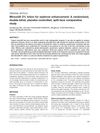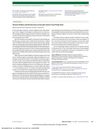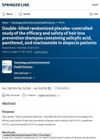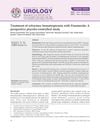 13 citations,
November 2013 in “The Journal of Dermatology”
13 citations,
November 2013 in “The Journal of Dermatology” Minoxidil 2% lotion is safe and effective for making eyebrows thicker and fuller.
 May 1963 in “American journal of obstetrics and gynecology”
May 1963 in “American journal of obstetrics and gynecology” Injecting 2 ml of TEEV every 4 weeks is better because it has the same benefits but fewer side effects.
 September 2017 in “Journal of Investigative Dermatology”
September 2017 in “Journal of Investigative Dermatology” Injections of special skin cells showed potential in treating hair loss, with some participants experiencing increased hair density.
 1 citations,
June 2018 in “JAMA Dermatology”
1 citations,
June 2018 in “JAMA Dermatology” Vitamin C was found to effectively treat prickly heat in children.
 1 citations,
September 2023 in “Journal of cosmetic dermatology”
1 citations,
September 2023 in “Journal of cosmetic dermatology” Silybum marianum flower extract may help increase hair growth and decrease hair loss.
3 citations,
October 2021 in “Clinical, Cosmetic and Investigational Dermatology” Setipiprant did not significantly improve hair growth in men with hair loss.
11 citations,
October 2021 in “Journal of The European Academy of Dermatology and Venereology” Topical finasteride is an effective and safer treatment for male hair loss.

Botulinum toxin type A significantly reduces scalp psoriasis severity compared to placebo.
 2 citations,
February 2016 in “British Journal of Dermatology”
2 citations,
February 2016 in “British Journal of Dermatology” Bimatoprost solution 0.03% is effective for treating sparse eyelashes.
 5 citations,
November 2016 in “Experimental and Therapeutic Medicine”
5 citations,
November 2016 in “Experimental and Therapeutic Medicine” BeauTop improves hair growth in androgenetic alopecia patients.
November 2014 in “PharmaTutor” Finasteride may help postmenopausal women with hair loss but is not effective for all and should be used cautiously in premenopausal women.
 2 citations,
July 2010 in “Clinical and Experimental Dermatology”
2 citations,
July 2010 in “Clinical and Experimental Dermatology” Delaying hair loss treatment reduces its effectiveness.
 30 citations,
March 2006 in “Dermatologic Surgery”
30 citations,
March 2006 in “Dermatologic Surgery” Finasteride improves surrounding scalp hair and increases hair density after hair transplant.
 66 citations,
April 2002 in “Journal of The American Academy of Dermatology”
66 citations,
April 2002 in “Journal of The American Academy of Dermatology” Finasteride increases hair weight and count in men with hair loss.
 July 1997 in “Journal of Cutaneous Medicine and Surgery”
July 1997 in “Journal of Cutaneous Medicine and Surgery” Finasteride significantly increases scalp hair and prevents hair loss in young and middle-aged men.
 7 citations,
January 2013 in “European Urology”
7 citations,
January 2013 in “European Urology” 5-Alpha reductase inhibitors may prevent prostate cancer but are not widely used due to concerns about trial relevance and potential risks, and more research is needed to confirm long-term benefits.
 136 citations,
April 2016 in “Dermatologic Surgery”
136 citations,
April 2016 in “Dermatologic Surgery” PRP treatment helps hair growth and density in androgenetic alopecia patients.
2 citations,
March 2022 in “Dermatologic Therapy” Latanoprost 0.005% solution safely increases hair density and regrowth in scalp alopecia areata.
 65 citations,
April 2002 in “Journal of Alternative and Complementary Medicine”
65 citations,
April 2002 in “Journal of Alternative and Complementary Medicine” Plant extracts effectively reduce hair loss and increase growth, offering a safe alternative treatment.
 1 citations,
April 2022 in “Toxicology and Environmental Health Sciences”
1 citations,
April 2022 in “Toxicology and Environmental Health Sciences” The shampoo with salicylic acid, panthenol, and niacinamide is effective and safe for preventing hair loss in people with alopecia.
 October 2023 in “Bangladesh journal of urology”
October 2023 in “Bangladesh journal of urology” Finasteride effectively treats hematospermia in 3 months without side effects.
January 2006 in “The Chinese Journal of Clinical Pharmacology” December 2022 in “Scientia Pharmaceutica” PRP is more effective than minoxidil and placebo for treating hair loss.
24 citations,
April 2008 in “Fertility and sterility” Pioglitazone improved insulin sensitivity and altered cortisol metabolism in PCOS patients.
 81 citations,
August 2011 in “Journal of The American Academy of Dermatology”
81 citations,
August 2011 in “Journal of The American Academy of Dermatology” Latanoprost 0.1% may effectively treat hair loss.
 42 citations,
November 2018 in “Archives of dermatological research”
42 citations,
November 2018 in “Archives of dermatological research” Apremilast was not effective in treating moderate-to-severe alopecia areata.
 214 citations,
September 2015 in “Stem Cells Translational Medicine”
214 citations,
September 2015 in “Stem Cells Translational Medicine” Platelet-rich plasma injections significantly improved hair regrowth and thickness in patients with hair loss.
February 2014 in “Faculty Opinions – Post-Publication Peer Review of the Biomedical Literature”  May 2016 in “Portuguese National Funding Agency for Science, Research and Technology (RCAAP Project by FCT)”
May 2016 in “Portuguese National Funding Agency for Science, Research and Technology (RCAAP Project by FCT)” Fenugreek gel significantly reduces split ends and improves hair health.





















